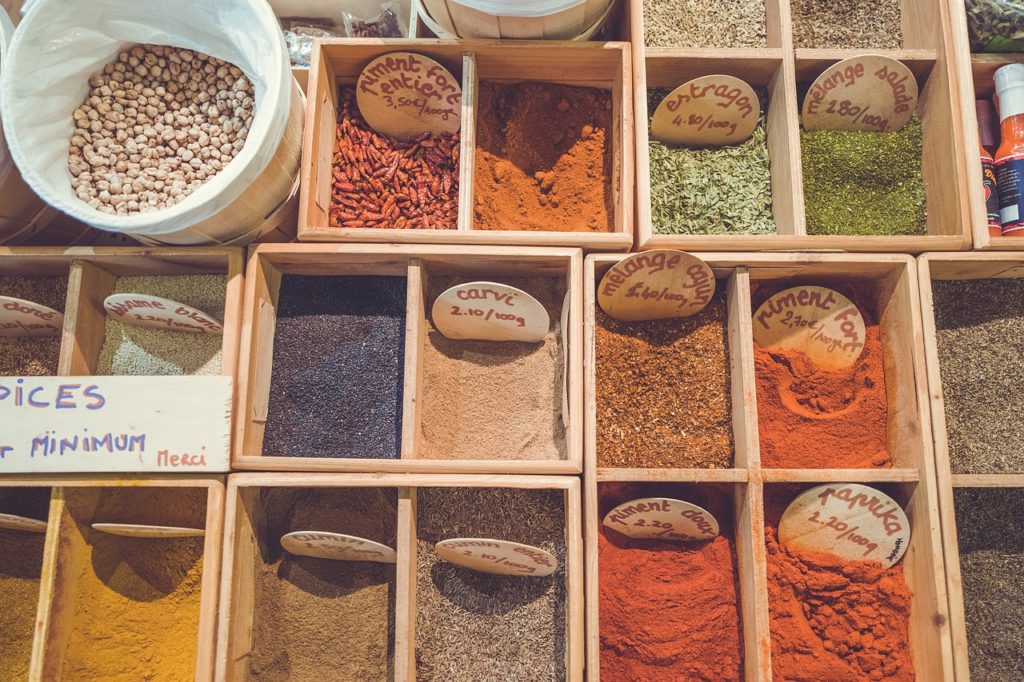 Living a healthy lifestyle doesn’t have to be synonymous with deprivation. In fact, a nutritious diet is full of abundance. Instead of focusing on subtracting foods or negative habits, it’s important to think about what habits we can add in to our daily routine to create a healthy lifestyle. Drinking more water, eating more fiber, and incorporating more herbs and spices are simple adjustments we can make to live a more nutritious life. Since herbs and spices have so much flavor, they allow us to cut back on ingredients like salt, sugar and fat. Plus, many spices in particular carry benefits.
Living a healthy lifestyle doesn’t have to be synonymous with deprivation. In fact, a nutritious diet is full of abundance. Instead of focusing on subtracting foods or negative habits, it’s important to think about what habits we can add in to our daily routine to create a healthy lifestyle. Drinking more water, eating more fiber, and incorporating more herbs and spices are simple adjustments we can make to live a more nutritious life. Since herbs and spices have so much flavor, they allow us to cut back on ingredients like salt, sugar and fat. Plus, many spices in particular carry benefits.
Believe it or not, inflammation is an essential part of human survival. Inflammation is the body’s natural response to protect itself from injury or infection. Acute inflammation can be a good thing by helping the body defend itself and repair. If this inflammation becomes prolonged and there is a failure to eliminate whatever caused it, chronic inflammation can be the end result.
Chronic inflammation can last for months to years, and can be exacerbated by lifestyle habits like obesity, smoking and sedentary living. A diet high in refined carbohydrates, sugars, fried foods and red meat are known to promote inflammation in the body. This is why a diet rich in anti-inflammatory foods and spices is crucial to promoting longevity and reducing disease.
The anti-inflammatory diet focuses on healthy, antioxidant-rich, whole foods. Specific foods known to reduce the risk of inflammation include olive oil, tomatoes, almonds, dark green leafy vegetables, fresh fish and fruits such as berries. There are several spices that can also provide anti-inflammatory benefits and add flavor to any healthy dish. Here are a few of my favorites:
Turmeric
Curcumin is a special component of turmeric that is known for its inflammation-fighting powers. There is evidence that curcumin can inhibit tumor initiation, promotion and invasion. Many people are intimidated by turmeric, but its mild flavor pairs well with many dishes. Try turmeric in a brown rice pilaf, or add to roasted vegetables. You can also sprinkle some in scrambled eggs.
Cayenne
The active ingredient in cayenne is called capsaicin, and it is known for its anti-inflammatory properties. Always remember to start with a small amount and gradually increase when cooking with cayenne. Try adding a pinch of cayenne to summer marinades and rubs for a spicy kick.
Ginger
Gingerol, a polyphenol in ginger, is also a relative of capsaicin- this explains why ginger has a bit of spiciness. Ginger has historically been used to help treat many diseases, and is known to protect tissues and organs from oxidative damage. Try adding fresh ginger to smoothies, or add a few slices to your tea.
Cinnamon
Cinnamaldehyde, a compound in cinnamon, is suggested to have anti-inflammatory effects in the body. Saigon cinnamon specifically is known for its spicy taste and beautiful aroma. Cinnamon offers a flavor boost in both hot and cold dishes. Add to oatmeal or simply sprinkle on a freshly cut apple for a tasty treat.
Use these spices in their food form and really let the flavors shine. Anti-inflammatory herbs and spices can make for a great addition to any main course or side dish.
Stefani Pappas, MS, RDN, CDN, CPT, is a Clinical Dietitian Nutritionist at St. Francis Hospital. She also provides private and group nutrition counseling at her office in Great Neck, NY. Visit her website www.StefHealthTips.com for more information.


















